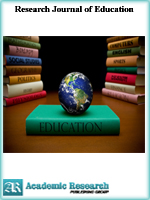Research Journal of Education
Online ISSN: 2413-0540
Print ISSN: 2413-8886
Print ISSN: 2413-8886
Quarterly Published (4 Issues Per Year)

Archives
Volume 10 Number 2 June 2024
Validation of Teachers Decision Making as Multi-Dimensional Construct; SmartPLS-3.2.4 Analysis
Authors: Kong Ling Di
Pages: 35-38
DOI: doi.org/10.32861/rje.102.35.38
Abstract
Due to complexity of duties, roles as well as responsibilities in the academic setting, teachers’ decision making as a construct has been very difficult to measure. This pilot study was carried out to validate the decision making instrument suitable for University teachers, as a second order construct through rigorous validation procedure. An instrument with 41 items measuring lecturers’ decision making on five point Likert scale were adapted from various studies and were distributed to seventy lecturers across seven faculties in Modibbo Adama University, Nigeria. The sixty-nine usable questionnaires collected, representing 99.1% response rate were analyzed with smartPLS 3.2.4. The findings of the study revealed that the items were valid and reliable for measuring teachers’ decision making. Findings also revealed that decision making was second order variable. Essentially, decision making questionnaire have demonstrated good psychometric properties in terms of internal consistency reliability as well as construct validity; it is suggested that further study should be carried out to replicate the study using a larger sample size.
Paul Kretschmer and Hansjorg Frommer About the language and Education of the Illyrians
Authors: Fatmire Vrapi ; Asllan Vrapi
Pages: 30-34
DOI: doi.org/10.32861/rje.102.30.34
Abstract
The European Renaissance brought important developments in science and at the same time in the studies of the language, history and culture of nations. Due to the Ottoman occupation and the geographical position, the language and history of the Albanians for a long time were unknown to German and European scholars in general. For these reasons, the first studies of Europeans focused on the study of Albanians as a separate entity within the empire. Albanians, being part of a region through which empires spread, conquered, strengthened, fought each other, promiscuous, weakened and replaced each other, had been part of the contributions to those developments. Albanians had lost part of their identity and gained at the same time, managing to preserve some distinctive features of the nationality such as language and historical and cultural heritage. An important contribution to the language, history and culture of the Albanians was made by German researchers. German albanologs have made a special contribution to albanology, language, history and culture of Albanians. Among German albanologs, Paul Kretschmer and Hansjorg Frommer are studied. Mainly their studies focus on archaeological finds, old writings, works of ancestors, oral heritage and linguistic, cultural and historical specifics.



